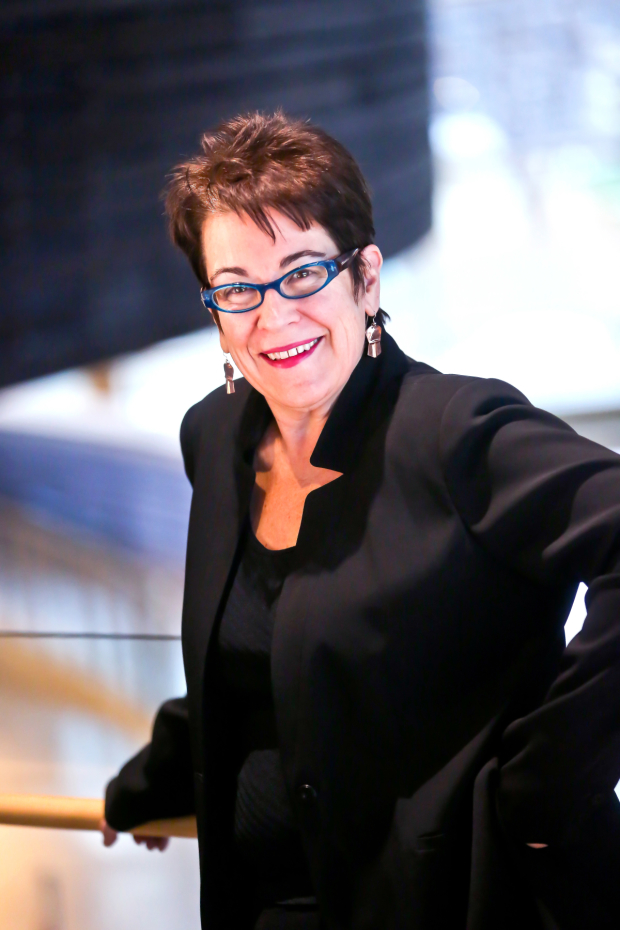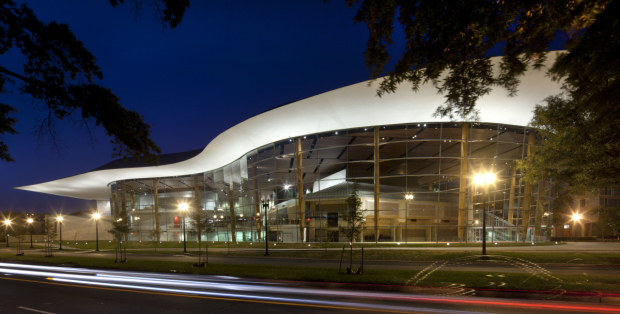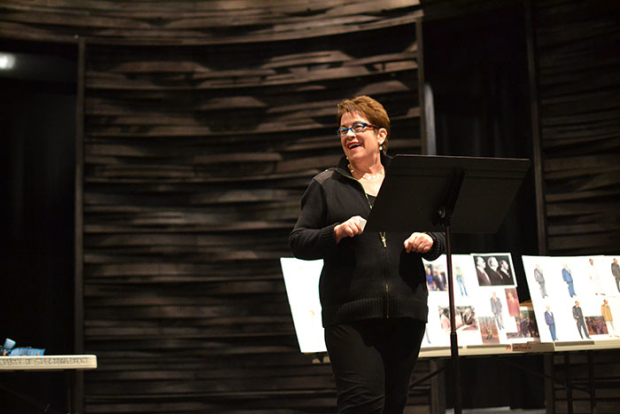Why Nothing Can Stop Arena Stage With Molly Smith at the Helm
For Arena Stage’s artistic director, everything is simple and obstacles don’t exist: a formula that seems to work.
At age 20, Arena Stage artistic director Molly Smith was a transfer student at Washington, D.C.'s Catholic University, where she befriended future Pulitzer Prize winner Paula Vogel. "We were kids," reminisces Smith, "and we would sit in corners and plot the revolution of the American theater."
But that whispered plotting wasn't a symptom of youthful idealism for Smith. Instead, it represented the beginnings of a life philosophy that would be the basis for her success in a career packed with big ideas and leaps of faith — because when Molly Smith sets her sights on a path, all obstacles seem to evaporate. Asked whether that "will-do" mentality has played a part in the huge success that Arena Stage has seen in the two decades of her tenure (she's celebrating her 20-year anniversary this season), Smith smiles, "Yeah, of course."

(© Tony Powell)
If her indomitable attitude was present from her student days, it coalesced into a day-to-day ideology during her time as artistic director of Alaska's Perseverance Theater (which she founded at the age of 26). Smith dreamed that her theater would be able to take plays all around her home state, so, by their second season, the troupe was touring from Nome to Kotzebue to Copper River — weekend-long trips that required travel by ferries and de Havilland Beaver planes. "We were like a little piece of the moon going into native villages, logging communities," says Smith, "and that was really formative for me because I realized that you can do anything — if you want to."
And because Smith always seems to want to, she surrounds herself with individuals who support her big dreams: first, by getting her artistic-direction legs in Alaska where, she says, "everybody says yes — 'I want to make a theater here.' 'Yes.' 'Will you help us out?' 'Yes.'" And second, by building her stable of artists at Arena through commissioning, with programs like Power Plays, as well as through her signature project: the new Mead Center for American Theater, a large-scale expansion of the theater's former campus. "The roofline is up 65 feet," Smith explains, "and I would say to artists for the first couple years we were there, 'You have to hit that, because these new theaters have been created for you.' And I think that that's happened."

(© Nic Lehoux courtesy of Bing Thom Architects)
That project came about as part of Smith's determination to honor Arena's legacy within the D.C. theater community while simultaneously muscling the company into a position as the leader of the pack of 21st-century national theaters. "Zelda [Fichandler, who cofounded Arena Stage in 1950] called the Mead Center the eighth wonder of the theater world," recalls Smith, explaining that Fichandler was thrilled with the way the new space was able to keep the heart (and physical theater spaces) of the past while revamping the building for the audiences of the future.

(photo provided by Arena Stage)
Smith has also accomplished similar feats with support for programs like the company's "giants festivals," which showcase the work of the giants of American theater like Edward Albee and Lillian Hellman, and Zelda Fichandler's Allen Lee Hughes Fellowship Program, which exists to cultivate the next generation of theater professionals of color.
"Arena was the first theater in Washington, D.C., that was inclusive of all races. Before that, all of the theaters were segregated. When I came to look at Arena, it was '98 or '97, I saw that some of the work that was being produced was diverse but the audience was not," Smith says, "so when I came in as artistic director, I knew that I wanted to change that around."
As she cast around for ways to change that dynamic, Smith took to walking the neighborhoods of D.C., occasionally going into places of worship "to get a sense both of what the pastors were talking about and how they were responding to the audience." At some of the African-American churches she visited, Smith noticed there were greeters waiting outside and ushering people all the way into the church. "Because theaters can feel elite to people," Smith remembers thinking, "that seemed to be a smart idea." So Arena's ushers started welcoming people all the way through — a small change but one that's been effective, and an example of Smith's eagerness to try the new and unexpected.
From pursuing a career in the arts to fighting for a multimillion-dollar revamp of her theater, to insisting on programming for an at-the-time nonexistent diverse audience, Smith never loses sight of the unusually smooth path she's envisioned for herself. As Arena heads into its third decade under her tenure, she is continuing to live out her legacy with presentations of two deeply personal works (what Smith calls "heart projects") — Snow Child and Sovereignty — as well as a renewed focus on commissioning.

(images provided by Arena Stage)
In addition, geographically relevant theater has remained integral to Smith's mission. "Geography is a huge part of what we do in the theater," says Smith, "because every theater is local first; that's your audience." In Alaska, where that mission first sprang to life for Smith, that meant focusing on Native American culture as well as Filipino and white cultures. It wasn't until halfway through her time at Arena that Smith realized she was already doing the same thing at her D.C. theater. "Arena really is by and about Americans. Going from Alaska to Washington, D.C., is extreme by any measure," she says, "[but] Washington, D.C., is a crossroads for American theater. We go to the theater to understand what it means to be American."
"If you have great art and great audiences and great marketing, just those three pieces, you can be on fire," she went on.
That recipe may sound overly simple, but, says Smith, "most things, when you can boil them down to their essence, do seem simple, [though] it usually is years of thinking about something." This philosophy goes a long way toward explaining Smith's response to being asked about the obstacles she sees on the path to Arena's future: "There are no other obstacles," she says. "We just make it happen."

(photo provided by Arena Stage)










